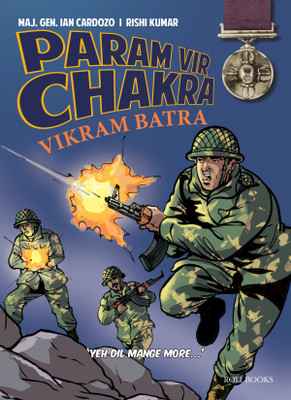PARAM VIR CHAKRA: VIKRAM BATRA - VIKRAM BATRA(English, Paperback, Rishi Kumar, Maj. Gen. Ian Cardozo)
Quick Overview
Product Price Comparison
THE KARGIL WAR of 1999 was a continuation of PakistanŌĆÖs obsession to wrest the state of Jammu and Kashmir from India. While Pakistani Politicians and diplomats were negotiating a peace agreement with India; the Pakistan Army was simultaneously pumping her armed forces across the line of control (LOC) in J&K, in the Kargil sector, proving once again that Pakistan can never be trusted. The war was preceded by armed intrusions by PakistanŌĆÖs special forces and infantry units, who occupied key locations in unheld areas on the Indian side of the LOC. Military posts here were traditionally maintained by both India and Pakistan only in the summer months and withdrawn from November to May. PakistanŌĆÖs aim was to cut the vital SrinagarŌĆōLeh highway, thereby cutting off supplies to Siachen with the hope that they would be able to evict the Indian troops from the Saltoro ridge above the Siachen glacier, and to also internationalize the Kashmir issue. This war was fought at heights ranging from 15,000 to 19,000 feet in a rarified deoxygenated atmosphere, where troops had to scale near perpendicular walls, encumbered with heavy loads of arms and ammunition. Notwithstanding these disadvantages, the brave Indian Jawan led by their young officers forced the Pakistani forces to withdraw. Amongst ŌĆśThe Young LionsŌĆÖ who led their men from the front was Vikram Batra, who not only became a household name, but the enemy also acknowledged his dynamic leadership and gave him the nickname of ŌĆśSher ShahŌĆÖ. Pakistan was astonished at the swift determined response from IndiaŌĆÖs political and military leadership, but the price paid by the Indian soldier was heavy and the white snow covered slopes were coloured ŌĆśRedŌĆÖ by the blood of these intrepid icons of courage. 23 Indian officers and 436 Jawans where killed and 54 officers and 629 Jawans were wounded, many disabled for life.


